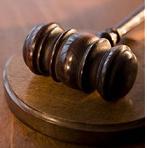Patent Lawyers
High Court all over the map in 'Bilski'
 In the end, Bilski may have been a bust.
In the end, Bilski may have been a bust.
After more than 60 briefs on both sides, oral arguments last November and an eight-month vigil for the ruling among patent lawyers, the decision in Bilski v. Kappos issued Monday may have done little to end the debate over what kinds of innovations are or are not eligible for patents.
The long-awaited decision was supposed to resolve the patent eligibility of business methods or processes that are not tied to a new machine or don't transform anything. But while rejecting one such patent, it did not rule out method patents in general, underlining that it "need not define further what constitutes a patentable process" beyond looking to guideposts provided by past U.S. Supreme Court decisions.
Justice Anthony Kennedy's majority decision agreed with the U.S. Court of Appeals for the Federal Circuit that the specific patent at issue -- a way of hedging against weather-related losses in the energy industry -- should not have been granted. All nine justices agreed that it was too abstract for patentability.
But for a smaller majority, Kennedy did not rule out all business methods patents and invited the Federal Circuit to keep trying to find a better test than the "machine or transformation" test, which he relegated to the status of a "clue" but not the only test.
Four justices, led by Justice John Paul Stevens, said that methods of doing business should never be patentable. They expressed "serious doubt" that business innovators need patents to succeed.
Stevens' concurrence, one day before he retired from the high court, had the look of a writing that could have started out as a majority opinion but lost its fifth vote. Stevens, who was joined by justices Ruth Bader Ginsburg, Stephen Breyer and Sonia Sotomayor, called the majority a "tepid disposition" of the case.
It was tepid enough, apparently, that even the lawyer for patent holders Bernard Bilski and Rand Warsaw did not concede defeat. Finnegan, Henderson, Farabow, Garrett & Dunner partner J. Michael Jakes, who argued the case for the patent holders, said, "We are disappointed by today's decision because we believed the Bilski/Warsaw claims should be patentable under the broad language of the Patent Act." But Jakes said he would work with his clients to revive their patent claim to meet the new guidance provided by the Court.
"The Supreme Court's narrow decision today in Bilski v. Kappos means that the game of 'hot potato' being played between the Federal Circuit and the Supreme Court will continue," said Dechert's Joshua Rawson.
"Business method patents are still alive and well -- or at least have survived this latest test," said Martin Raskin of Cozen O'Connor. "This decision is a win for financial institutions and software companies, but clearly not what companies like Google and Yahoo! would have liked."
"The long-anticipated Bilski opinion was released today with more of a thud than a splash," said Keith McWha of Day Pitney. "The Supreme Court left open the question of what would be needed for a business method to be considered patentable subject matter. Also left open are the questions of patentable subject matter for software patents and medical diagnostic methods."
"In the short run, there may be fewer claims for patent infringement," said Cynthia Kernick of Reed Smith. "At the end of the day, though, smart people will still figure out how to make money from the patent system and business methods no matter what the Supreme Court rules."
The case involved a patent application filed by Bilski and Warsaw, businessmen from Pittsburgh, for a way to help utility companies and their customers to regularize costs by considering factors of supply, demand and weather.
Bilski and Warsaw, self-described math geeks, filed their patent claim in 1997. The patent examiner rejected it as unrelated to any machine. The U.S. Court of Appeals for the Federal Circuit also rejected the claim, ruling in 2008 that the process for anticipating and hedging risk in commodities markets did not deserve a patent because it was not tied to a machine and did not result in a physical transformation.
The circuit ruling sent shock waves through the patent law world, with critics saying the decision would slow innovation in the areas of information technology and financial services, in which patents are sought -- and have been granted -- for new processes that are less tangible than a physical invention. Critics of the Federal Circuit decision warned in amicus curiae briefs that, if its test is upheld, thousands of existing, pending or future patents would be threatened.
During oral argument last November, most justices appeared deeply skeptical of the patent claim. But the long period between argument and decision -- it was the oldest pending case on the argument docket this term -- left lawyers wondering whether the Court was so divided that it would rule narrowly with numerous concurrences and dissents.
(Published by Law.com – June 29, 2010)